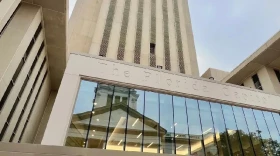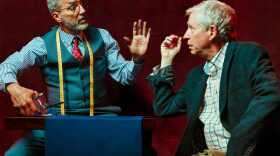A quick survey of the landscape of summer theater camps across Southwest Florida reveals a heavy emphasis on musicals. So where does an aspiring young actor go to learn and develop the skills to perform drama?
The clear and singular answer this summer is the Laboratory Theater of Florida, where campers are hard at work laying a ‘trap’ for the audiences who attend their summer stock performances July 15-16.
Lab Ed isn’t performing any run-of-the-mill drama. Under the direction of Steven Michael Kennedy and Madelaine Weymouth, they’re producing a documentary-style play that’s unlike anything local audiences have ever seen before.
“When people hear ‘kid’s show,’ especially when they think of kids’ camp show, they automatically think of … small musicals, happy musicals and things they have seen or heard before that are really famous,” said Weymouth. “Trap” is a regional premiere, so nobody in Southwest Florida has done this play before, and instead of being a comedy or being a musical, this show is really suspenseful and really gives kids the opportunity to practice creating tension, which is different from other shows that people might expect middle and high schoolers to do at this level of theater.”
Playwright Stephen Gregg based “Trap” on a real-life incident that took place in the Oak Box Theatre in Menachap, California, where the local high school theater department was performing a play.
Incomprehensively, every person in the theater was knocked unconscious – except one, Angela Lure, who must now work with Detective Gwendolyn Heche to discover what happened.
While the plot is captivating on its own, it’s Gregg’s documentary-style storytelling that keeps audiences on the edge of their seats throughout the entire performance.
“The play is based off of interviews that were done with the people who were involved, as well as security footage, photos, newspaper articles and emails about the event at the time,” said Weymouth.

Every scene is designed to illustrate the fear and perplexity that first responders, detectives, and forensic psychologists felt as they investigated the incident.
Kennedy and Weymouth’s campers do an excellent job of creating and fomenting an aura of anxiety and disquiet within each audience member that will linger well past the end of the play.
In fact, “Trap” contains so many twists and turns, betrayals and treachery, that the audience will begin to doubt what was real and what was not.
This makes “Trap” different from other dramatic plays produced at The Laboratory Theater or theaters elsewhere, as camper Brigid Birdie McManus explains.
“It’s really unique. Without giving too much away, it incorporates a lot of elements that not all plays do, and it has a lot of twists that an audience member might not expect. A lot of plays, I find, and movies and TV and stories and everything have similar themes. There’s only so many things and common themes you can create, but this is something that’s kind of unlike any movie I’ve seen or play I’ve seen or anything like that.”
McManus plays Detective Gwendolyn Heche, who finds herself in the middle of a firestorm of fear and confusion, but she and fellow camper Kat Solis are up for the challenge of portraying professional adults.
Solis not only plays a police sergeant, but a forensic engineer, which makes Kat “nervousited” – meaning nervous and excited at the same time.
“I feel nervous because I think I might mess up accidentally, once, and I’m also very excited because I want to have people see how much I actually put my effort into, like, doing my part,” said Solis.
“I would actually love to do more of this. It’s frickin’ amazing. I love it; putting like an entire play in front of people.”
Solis isn’t the only camper who plays multiple roles in “Trap.” Luvie Grimes plays four different characters, including the 911 operator who took Angela Lure’s call for help and one of the 241 victims who fell unconscious that fateful night at the Oak Box Theatre. While Grimes is having no trouble memorizing lines and transitioning from one character to another, she’s found playing a coma patient surprisingly difficult.
“The stage is really hard and when I got up, because I’m lying there for like 15 minutes, and when I get up my back hurts really badly and my mom had to massage my back when I got home,” said Grimes, laughing.
All of these young actors relish the chance to play multiple characters because each one requires them to change their onstage demeanor and movements, their voice and cadence and the personality they must project in order to advance the story to its ultimate conclusion. This serves to really accelerate their learning curve.
“This is the kind of show where, because of the fact that so many kids are playing multiple roles, there is an opportunity for them to play multiple different styles of characters,” said Co-Director Steven Michael Kennedy.
“So, there are a lot of different age groups of characters. Some are students. Some are adults. There are a lot of times where someone will be playing a kid in one scene and in the next scene they’re this professional. So, we have to really focus on, ‘okay, how do you differentiate them between the student and the adult?’ And so that is something we really get to focus on with the kids that we don’t always get the experience of doing.”
While for the majority of Lab Ed campers “Trap” represents their first time on stage before a live audience, Rylan Digman, who plays firefighter Ephrain Salas, has done a number of prior performances at the school he attends. From that vantage, he especially appreciates the time and attention he’s getting at the Laboratory Theater’s summer camp.
“What I like most about this summer camp is that I get more time to have acting practice than I would at school, and all the people here are really nice. And I have a really good time. The counsellors are really nice. It’s just fun,” said Digman.
In addition to learning acting skills some of the campers, like Finley Lucas, are working backstage learning the production side of theater from sound and special effects to props and stage management.
“This is the first full theater summer camp I have ever done and it’s been a blast so far. I have absolutely loved it,” Finley effuses.
“Just making new friends and meeting new people my age with similar interests.”
While the camaraderie and learning opportunities afforded by summer theater camp are important to the campers on an individual basis, collectively this group can’t wait to strut their stuff and bring a quality theater experience to the stage.
But be forewarned. These kids are laying a trap.
What happened at the Oak Box Theater in Menachap, California is not necessarily confined to the past. Plus, the old church in which the Laboratory Theater performs has its own peculiarities, which will only add to the mystery of how an entire theater of performers and audience members fell unconscious.
Are you up to solving the puzzle? If so, just remember - when it comes to “Trap,” things are not what they seem.
This is a limited run with 8 p.m. performances Friday, July 15 and Saturday, July 16, as well as a Saturday 2 p.m. matinee, so secure your seats early.
To read more stories about the arts in Southwest Florida visit Tom Hall's website: SWFL Art in the News.
Spotlight on the Arts for WGCU is funded in part by Naomi Bloom, Jay & Toshiko Tompkins, and Julie & Phil Wade.
WGCU is your trusted source for news and information in Southwest Florida. We are a nonprofit public service, and your support is more critical than ever. Keep public media strong and donate now. Thank you.









